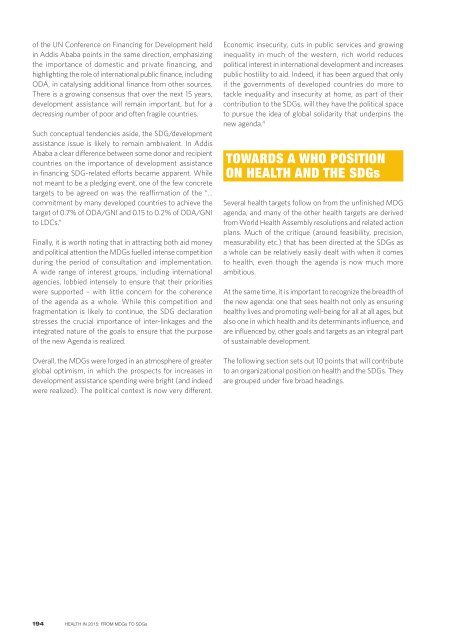Create successful ePaper yourself
Turn your PDF publications into a flip-book with our unique Google optimized e-Paper software.
of the UN Conference on Financing for Development held<br />
in Addis Ababa points in the same direction, emphasizing<br />
the importance of domestic and private financing, and<br />
highlighting the role of international public finance, including<br />
ODA, in catalysing additional finance <strong>from</strong> other sources.<br />
There is a growing consensus that over the next 15 years,<br />
development assistance will remain important, but for a<br />
decreasing number of poor and often fragile countries.<br />
Such conceptual tendencies aside, the SDG/development<br />
assistance issue is likely <strong>to</strong> remain ambivalent. In Addis<br />
Ababa a clear difference between some donor and recipient<br />
countries on the importance of development assistance<br />
in financing SDG-related efforts became apparent. While<br />
not meant <strong>to</strong> be a pledging event, one of the few concrete<br />
targets <strong>to</strong> be agreed on was the reaffirmation of the “…<br />
commitment by many developed countries <strong>to</strong> achieve the<br />
target of 0.7% of ODA/GNI and 0.15 <strong>to</strong> 0.2% of ODA/GNI<br />
<strong>to</strong> LDCs.”<br />
Finally, it is worth noting that in attracting both aid money<br />
and political attention the MDGs fuelled intense competition<br />
during the period of consultation and implementation.<br />
A wide range of interest groups, including international<br />
agencies, lobbied intensely <strong>to</strong> ensure that their priorities<br />
were supported – with little concern for the coherence<br />
of the agenda as a whole. While this competition and<br />
fragmentation is likely <strong>to</strong> continue, the SDG declaration<br />
stresses the crucial importance of inter-linkages and the<br />
integrated nature of the goals <strong>to</strong> ensure that the purpose<br />
of the new Agenda is realized.<br />
Overall, the MDGs were forged in an atmosphere of greater<br />
global optimism, in which the prospects for increases in<br />
development assistance spending were bright (and indeed<br />
were realized). The political context is now very different.<br />
Economic insecurity, cuts in public services and growing<br />
inequality in much of the western, rich world reduces<br />
political interest in international development and increases<br />
public hostility <strong>to</strong> aid. Indeed, it has been argued that only<br />
if the governments of developed countries do more <strong>to</strong><br />
tackle inequality and insecurity at home, as part of their<br />
contribution <strong>to</strong> the SDGs, will they have the political space<br />
<strong>to</strong> pursue the idea of global solidarity that underpins the<br />
new agenda. 4<br />
TOWARDS A WHO POSITION<br />
ON HEALTH AND THE SDGs<br />
Several health targets follow on <strong>from</strong> the unfinished MDG<br />
agenda, and many of the other health targets are derived<br />
<strong>from</strong> World Health Assembly resolutions and related action<br />
plans. Much of the critique (around feasibility, precision,<br />
measurability etc.) that has been directed at the SDGs as<br />
a whole can be relatively easily dealt with when it comes<br />
<strong>to</strong> health, even though the agenda is now much more<br />
ambitious.<br />
At the same time, it is important <strong>to</strong> recognize the breadth of<br />
the new agenda: one that sees health not only as ensuring<br />
healthy lives and promoting well-being for all at all ages, but<br />
also one in which health and its determinants influence, and<br />
are influenced by, other goals and targets as an integral part<br />
of sustainable development.<br />
The following section sets out 10 points that will contribute<br />
<strong>to</strong> an organizational position on health and the SDGs. They<br />
are grouped under five broad headings.<br />
194 HEALTH IN 2015: FROM MDGs TO SDGs


